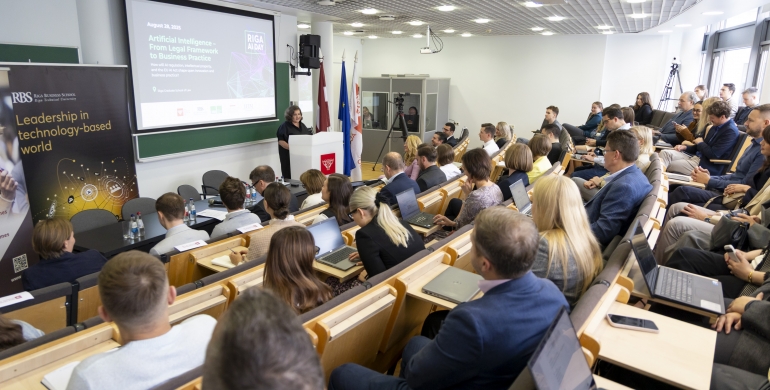Thank you to all participants of the conference “RIGA AI DAY: Artificial Intelligence – From Legal Framework to Business Practice” taking place on August 28, 2025, at Riga Graduate School of Law. The Conference was organised by RGSL and RTU Riga Business School in collaboration with Ludwig Maximilian University, Munich; Bucerius Law School, Hamburg; the Institute for Intellectual Property and Market Law; and Stockholm University.
In the age of AI, open-source innovation – collaborative, cost-efficient, and operating on the frontier of knowledge- is an indispensable complement to proprietary approaches within the broader AI innovation ecosystem, says one of the conference organisers, Prof. Dr. Dana Beldiman, Bucerius Law School, Hamburg, Germany, University of California Law, San Francisco, USA.
Copyright’s fundamental doctrines are flexible enough to deal with the AI challenge. But there might be a need for (new) forms of collective licensing or similar instruments to achieve a fair balance of interests in the new AI world, says Prof. Dr. Matthias Leistner, LL.M. (Cambridge), Ludwig Maximilian University Munich.
The conference offered valuable insights into EU regulations, especially regarding copyright protection and the AI Act. However, the most meaningful part for me was a discussion panel with business representatives, which illuminated their hopes, concerns, and practical needs, says Dr. Vija Kalniņa, Judge at the Court of Economic Affairs of the Republic of Latvia.
Here are some of her key takeaways:
• We don’t just need AI literacy – we urgently need AI Act literacy. Businesses are asking for clear, tailored explanations of this complex law. With 113 articles, 13 annexes, 180 recitals, and even a 13-page EC explanation on what counts as an “AI system”, it’s no surprise that many feel frustrated, confused, or discouraged.
• The excitement around regulatory sandboxes was present, with hopes that they will be properly funded and will have the necessary expertise to support business innovations.
• Interestingly, motivation to comply remains low. With another year before the AI Act fully comes into force, compliance is likely to be mostly driven by external pressure – including regulators, investigations, and potential penalties – rather than by internal motivation. This reflects what I’ve been hearing from practitioners in Latvia, and it makes me wonder if cultural factors are also influencing this.
“Nevertheless, I’m glad these conversations are taking place in Latvia. Businesses here are curious, pragmatic, and already exploring how compliance could even become a strategic advantage – a badge of safety and effective risk management,” says Dr. Kalniņa.
Many thanks to the Minister of Justice, Inese Lībiņa-Egnere, and the Chairwoman of the RGSL Board, Dr. iur. Inga Kačevska for opening the conference, to the keynote speakers, moderators and panelists Prof. Dr. Matthias Leistner and Dr. Lucie Antoine (LMU), Prof. Dr. Dana Beldiman, Dr. Claudio Rivera, Dr. Edgars Voļskis, Dr. Alessio Buscemi, Aiga Irmeja, Artūrs Arnis Polikarpovs, Sarmis Spilbergs, Uldis Karlovs-Karlovskis, Madara Melne-Krūmiņa, and Kaspars Mezeriņš for your valuable insights into the complicated topic of AI and regulation.
The largest thanks go to Prof. Dr. Dana Beldiman and Dr. Claudio Rivera for the conference idea and for putting it all together, and to the RBS and RGSL teams for making it happen.

